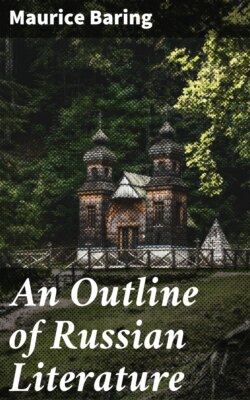An Outline of Russian Literature

Реклама. ООО «ЛитРес», ИНН: 7719571260.
Оглавление
Baring Maurice. An Outline of Russian Literature
An Outline of Russian Literature
Table of Contents
PREFACE
AN OUTLINE OF. RUSSIAN LITERATURE
CHAPTER I. THE ORIGINS
Footnote
CHAPTER II. THE NEW AGE—PUSHKIN
Footnote
CHAPTER III. LERMONTOV
CHAPTER IV. THE AGE OF PROSE
CHAPTER V. THE EPOCH OF REFORM
CHAPTER VI. TOLSTOY AND DOSTOYEVSKY
CHAPTER VII. THE SECOND AGE OF POETRY
CONCLUSION
CHRONOLOGICAL TABLE
INDEX
Отрывок из книги
Maurice Baring
Published by Good Press, 2021
.....
Nevertheless windows had been opened which could not be shut, and the light which had streamed in produced some remarkable fruits.
When Alexander I came to the throne, the immediate effect of his accession was the ungagging of literature, and the first writer of importance to take advantage of this new state of things was Karamzin (1726-1826). In 1802 he started a new review called the Messenger of Europe. This was not his début. In the reign of Catherine, Karamzin had been brought to Moscow from the provinces, and initiated into German and English literature. In 1789-90 he travelled abroad and visited Switzerland, London and Paris. On his return, he published his impressions in the shape of “Letters of a Russian Traveller” in the Moscow Journal, which he founded himself. His ideals were republican; he was an enthusiastic admirer of England and the Swiss, and the reforms of Peter the Great. But his importance in Russian literature lies in his being the first Russian to write unstudied, simple and natural prose, Russian as spoken. He published two sentimental stories in his Journal, but the reign of Catherine II which now came to an end (1796) was followed by a period of unmitigated censorship, which lasted throughout the reign of the Emperor Paul, until Alexander I came to the throne. The new review which Karamzin then started differed radically from all preceding Russian reviews in that it dealt with politics and made belles lettres and criticism a permanent feature. As soon as Karamzin had put this review on a firm basis, he devoted himself to historical research, and the fruit of his work in this field was his History of the Russian Dominion, in twelve volumes; eight published in 1816, the rest in 1821-1826. The Russian language was, as has been said, like an instrument waiting for a great player to play on it, and to make use of all its possibilities. Karamzin accomplished this, in the domain of prose. He spoke to the Russian heart by speaking Russian, pure and unmarred by stilted and alien conventionalisms.
.....